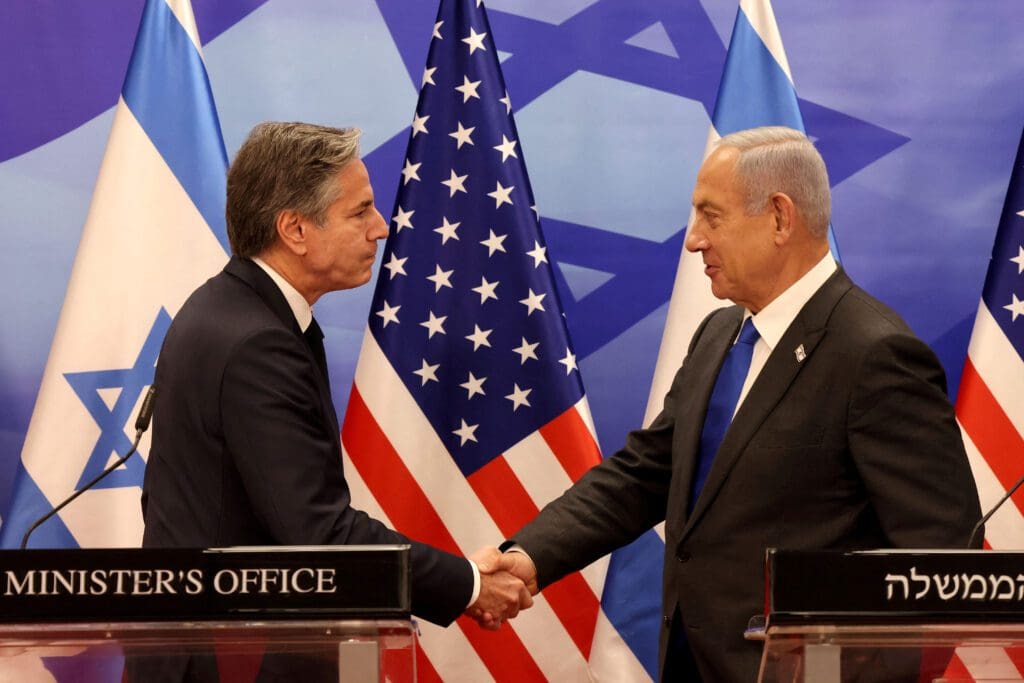Since the start of its term, the administration of U.S. President Joe Biden has been reluctant to engage substantively with the Israeli-Palestinian issue. Instead, it has focused its limited efforts on perpetuating the status quo, on the pretext that circumstances are not conducive to initiatives to change it. What can be described as a policy of “strategic neglect” is intended to preserve political capital by keeping the Palestinian Question off the regional and international agendas so that Washington can attend to other foreign policy priorities, such as Iran’s nuclear program, competition with China, and, since last year, Russia and the war in Ukraine.
But this low-rent approach has failed. Time and again over the past two years, the administration’s attempt to ignore reality has been trumped by unignorable developments, including escalating tensions and spiraling violence that have threatened to undermine the U.S. agenda.
2023 is developing into yet another demonstration of the folly of strategic neglect, as well as its lethal consequences. With Benjamin Netanyahu once again at the helm of Israeli politics, and with a supporting cast that would fit right into a Mussolini cabinet, Israel’s leaders are engaging in systematic provocations against the Palestinians and have further escalated violence in the West Bank to a level not seen since the Al-Aqsa Uprising of 2000-2004. Far from keeping Palestine on the back burner, the policy now threatens not only the Palestinians but also the regional stability prioritized by Washington.
Fundamentally Flawed
In practice, strategic neglect and the perpetuation of the status quo amount to continued U.S. support for the consolidation of permanent Israeli rule over the Palestinians, and Israeli impunity as it pursues this objective. In point of fact, the Biden administration declined to repeal the numerous measures and initiatives implemented by the Trump administration in support of Israel’s annexationist agenda. Biden also adopted his predecessor’s signature policy of pursuing Arab-Israeli normalization in order to further marginalize the Question of Palestine. And just as tellingly, Washington continues to oppose Palestinian initiatives, such as recourse to the International Criminal Court and International Court of Justice, intended to challenge annexation.
The problem for Washington is that the status quo – creeping annexation – is inherently dynamic. A continuously active Israeli campaign to dispossess the Palestinians, it consistently provokes Palestinian resistance, producing chronic instability. A policy premised on a static reality is therefore fundamentally flawed. And if it additionally prioritizes stability while doing nothing to arrest or reverse creeping annexation it is simply illusory.
This was in fact visibly demonstrated to Biden and his Secretary of State Antony Blinken during their first months in office, when Israeli assaults on the Sheikh Jarrah neighborhood in East Jerusalem and the Al-Aqsa Mosque escalated into confrontations throughout Israel and the occupied territories that resulted in several thousand casualties. As pro-Palestinian demonstrations expanded to a massive scale throughout the Arab world and Chairman of the US Joint Chiefs of Staff Gen. Mark Milley warned of “broader destabilization” if Israel’s rampage continued, high-level U.S. involvement was required to bring it to a halt. Still, the policy of neglect remained intact.
Impunity Fuels Extremism
In response to the most recent surge in violence and provocations from Israel’s new government, Palestinian leader Mahmoud Abbas responded in January with a statement that the Palestinian Authority (PA) was suspending coordination with the Israeli security forces. Abbas—long-ago exposed by this reality as an illegitimate and ineffectual appendage to Israeli rule—ordered his diplomats to promote a UN Security Council resolution put forward by the United Arab Emirates that would reconfirm the illegality of Israeli settlements. With Washington unwilling to censure Israel for violations of international law, and similarly reluctant to function as the lone voice in support of Israeli annexation while demanding that the rest of the planet denounce Russian annexation of Ukrainian territory, officials and analysts alike noted that the Palestinians were in the enviable position to exercise leverage over the Americans.
Nevertheless, the U.S. successfully engineered the withdrawal of the draft resolution and its replacement with an anodyne presidential statement in which the only “obligation” of a named party is that of the “Palestinian Authority to renounce and confront terror.” The price the administration paid for avoiding an embarrassing veto was a commitment to invite Abbas to the White House later this year.
According to Israeli journalist Barak Ravid, a further U.S. “concern” was that a Security Council vote “would have led to further escalation between the Israelis and Palestinians ahead of the [upcoming] historically sensitive period of Passover and the holy month of Ramadan.” Yet escalation is the precise, and entirely predictable, outcome of Blinken’s efforts to shield Israel from accountability for its actions. On February 22, less than 48 hours after the Security Council timidly called on “all parties to observe calm and restraint” and for “de-escalating the situation on the ground,” 11 Palestinians were killed in a massive mid-morning Israeli assault on Nablus.
Washington responded on February 26 by convening high-level Israeli-Palestinian talks in the Jordanian port of Aqaba together with Jordan and Egypt, which produced their first joint communique in years. In it, Israel pledged to temporarily refrain from additional settlement initiatives, a meaningless commitment because Israeli deliberations on new settlement initiatives had already been scheduled for a date after the expiration of the Aqaba agreement. Netanyahu and other senior officials additionally made clear that their “commitment to work to immediately end unilateral measures” would not affect the implementation of existing decisions on settlement expansion.
As the parties thanked Washington for its “indispensable role in efforts to prevent deterioration and find horizons for peace,” the disconnect between the proceedings in Aqaba and reality west of the River Jordan, and the PA’s irrelevance to this reality, was underscored that same day. In the town of Huwarra, a Palestinian gunman shot dead two Israeli settlers in retaliation for an earlier raid on the adjacent city of Nablus. A settler rampage through Huwwara followed that evening, which was characterized by the most senior Israeli military commander in the West Bank, Major-General Yehuda Fuchs, as well as numerous Israeli mainstream commentators, as a “pogrom.” As if to underscore the point, Israel’s Minister of Finance, Bezalel Smotrich, demanded that Israel act “in a way that conveys that the master of the house has gone crazy,” and several days after the rampage declared that “Huwwara needs to be erased” by the government’s own hand.
Claims that the Israeli military failed to prevent the Huwwara rampage because it was caught off-guard by settlers whose leaders were openly announcing their intentions on social media, are at best laughable. The reality is that armed settlers have consistently been enabled and protected by the military as a matter of policy, and effectively function as an auxiliary militia in the service of the Israeli state. Settlers and enthusiasts of their agenda are well-represented within the Israeli military, and a number of their most fanatical leaders currently occupy not only Palestinian land but also high offices of state.
As it happened, the army several day later performed with exemplary efficiency when it prevented a group of activists from entering Huwwara to express their solidarity with its Palestinian residents, in the process manhandling former parliamentary speaker Avraham Burg. Yet on March 6 soldiers again allowed a group of settlers to rampage through the town, this time dancing with them in the streets in celebration of the Jewish holiday of Purim. The killing of six more Palestinians by the Israeli military in Jenin the following day, and Washington’s endorsement of the attack as Israel’s “legitimate right,” are entirely consistent with the flow of events.
Neglecting the Cliff
Although Israel is the primary beneficiary and the Palestinian people the main casualty of Washington’s policy of strategic neglect, it is above all designed to serve U.S. interests. Yet, as recent events have made increasingly clear, it is based on the flawed premise that Israel is sufficiently powerful and rational, and the Palestinians sufficiently powerless, to produce prolonged stability between the Mediterranean Sea and River Jordan, and thus keep the Question of Palestine off the regional and international agenda. How Israeli-Palestinian relations will develop in the coming weeks and months is difficult to predict and subject to numerous variables. It is however already evident that Washington’s policy is doomed to failure and heading towards a cliff with increasing velocity.
The opinions expressed in this article are those of the authors and do not necessarily reflect the views of the Middle East Council on Global Affairs.


